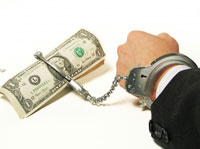Corruption may ruin China's economy soon
Runaway corruption in China, says a compelling new report, poses a lethal threat to the nation's economic development and "undermines the legitimacy of the ruling Chinese Communist Party."

Evidence from official audits, press articles and law enforcement data, the report says, indicates that "corruption in China is both pervasive and costly." Bribery, kickbacks, theft and fraud, particularly by party and government officials, are said to be rampant.
Minxin Pei wrote the report, issued last month by the Carnegie Endowment for International Peace, based in Washington. Pei, who gives his name in Western fashion, family name last, is a political scientist educated at the Shanghai International Studies University. He earned his Ph.D. at Harvard, and his work has been widely published in the U.S.
The report asserts that corruption in China "has spillover effects beyond its borders" that hurt American, Japanese and other foreign investors. "Illicit behavior by local officials could expose Western firms to potentially vast environmental, human rights and financial liabilities," the report contends.
Public statements by President Hu Jintao, Prime Minister Wen Jiabao and other senior officials suggest that China's leaders are well aware of the widespread corruption but have been unwilling to curb it. The report says: "The odds of an average corrupt official going to jail are at most 3 out of 100, making corruption a high-return, low-risk activity."
The reason: If President Hu comes down too hard on corruption, he risks losing support of delegates to the recently-held party Congress who elected him. Those delegates are drawn largely from party officials at the local and provincial levels.
Pei is not alone in assessing corruption in China. George Zhibin Gu, an investment banker who was educated at Nanjing University and earned a Ph.D. at the University of Michigan, has suggested that corruption may destroy China's economy that has been surging ahead at 8 to 10 percent a year. In the West, a 3 percent growth rate is respectable.
Moreover, China's government-controlled news agency, Xinhua, frequently details specific instances of corruption. Last week, the Chinese government was reported to have banned fire department officials from receiving sexual favors from companies seeking their protection.
Scrutinized through a wide-angle lens, corruption is but the foremost of the internal ills that jeopardize China's economic and political strength. Unemployment and under-employment, in which a worker has only one or two days of work a week, may be more than 25 percent.
Paradoxically, China has begun to experience shortages of skilled labor needed for its expanding industry. Economic progress has been uneven, with coastal cities leaving the rural interior far behind, realclearpolitics.com reports.
Financier Warren Buffett and Prime Minister Stephen Harper make an astute team of investment advisers. Mr. Buffett says people should be wary of investing in China. Mr. Harper says people should be wary of Chinese investment in Canada. Now, in a devastating analysis of China's systemic corruption, a distinguished academic predicts - "inevitably" - an end to the country's three decades of rapid economic expansion.
Author and commentator Minxin Pei is a political scientist (and Harvard PhD) who directs the China Project at the Washington-based Carnegie Endowment think tank. (Carnegie operates its own research centre, affiliated with a number of Chinese universities, in Beijing.)
Mr. Pei calls China's "endemic corruption" the No. 1 reason for the country's coming crisis in government - a crisis, he says, which could bring down the Communist Party dictatorship. If he is right, Mr. Buffett will look good for selling his PetroChina shares (some purchased for 22 cents [U.S.] and some sold for $19.40). If he is right, Mr. Harper will look good for his tough approach with China on human rights as well as on China's purchase, through state-owned enterprises, of strategic Canadian companies.
Mr. Pei describes China as a number of mafia states run by corrupt officials, from the highest levels down to the lowest, who themselves form the Communist Party of China - which explains why the party will never be able to reform itself, why the party will never adapt either to democratic or to free-market norms.
Many people think the Communist Party wants to end the corruption, Mr. Pei says, citing public executions and long prison sentences. The appearances, though, are deceiving.
Beijing punishes only a small proportion of its corrupt officials, all of whom are party members. Although as many as 190,000 government officials are cited for corruption every year, 80 per cent of them get only a warning. Only 20 per cent get expelled from the party. Fewer than 6 per cent are prosecuted and only half of these serve jail time, theglobeandmail.com reports.
"The odds that a corrupt official will go to jail are, at most, three out of 100," Mr. Pei says, "making corruption a high-return, low-risk activity."
Source: agencies
Subscribe to Pravda.Ru Telegram channel, Facebook, RSS!





